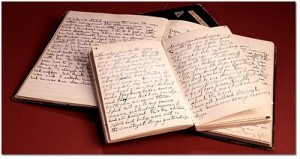Discovering Your Female Ancestors
If you are trying to trace your female ancestors, chances are you’ve hit some road blocks and difficulties locating them in documented records. Before the 20th century, law and tradition focused record keeping primarily on the male head of the household. Unfortunately for us, this means women are often missing from official records, making their genealogy all the more difficult to trace. Here are a few other places you can search for your female ancestors:
 Diaries, Journals and Letters
Diaries, Journals and Letters
If you are fortunate enough to have in your possession a personal diary of your female ancestor, you will have a treasure trove of intimate information right from the source. Diaries provide great insight into the daily lives of your ancestors. Their personal thoughts and musings, and details about family, friends and neighbors are right in your hands! If you have the opportunity, look through letters exchanged between your relatives or their friends. You’d be surprised how much you can learn about your ancestor’s life. If your family no longer has possession of your ancestor’s diary, it might have been donated to a repository. You can try to locate it by first checking out where your ancestor lived. Try visiting the local historical society or search public and university libraries to locate your ancestor’s diary. If you’re in the U.S., you may want to try the National Union Catalog of Manuscript Collections (NUCMC). Operated by the Library of Congress, the NUCMC provides a searchable catalogue of manuscripts reported by repositories from all around the country.
Cemetery
While visiting the grave of an ancestor, make sure you search nearby plots. Sometimes the only record you may find on your female ancestor is her grave, especially if she died young. Typically, if the woman died during childbirth, you will also find the grave of the infant nearby. Check out our post for tips on visiting cemeteries.
Newspapers
Newspapers can offer several genealogical details about your female ancestors. They will often include birth notices, marriage and baptism announcements, and obituaries. Local newspapers may offer more biographical information than newspapers from big cities. Look over any society news or local gossip sections; you never know if you’ll find your ancestor mentioned.
And don’t forget to record any information you find onto your family tree on Geni!







 Genealogy Discussions
Genealogy Discussions Genealogy Projects
Genealogy Projects Popular Genealogy Profiles
Popular Genealogy Profiles Surnames
Surnames The Geni Blog
The Geni Blog The World Family Tree
The World Family Tree